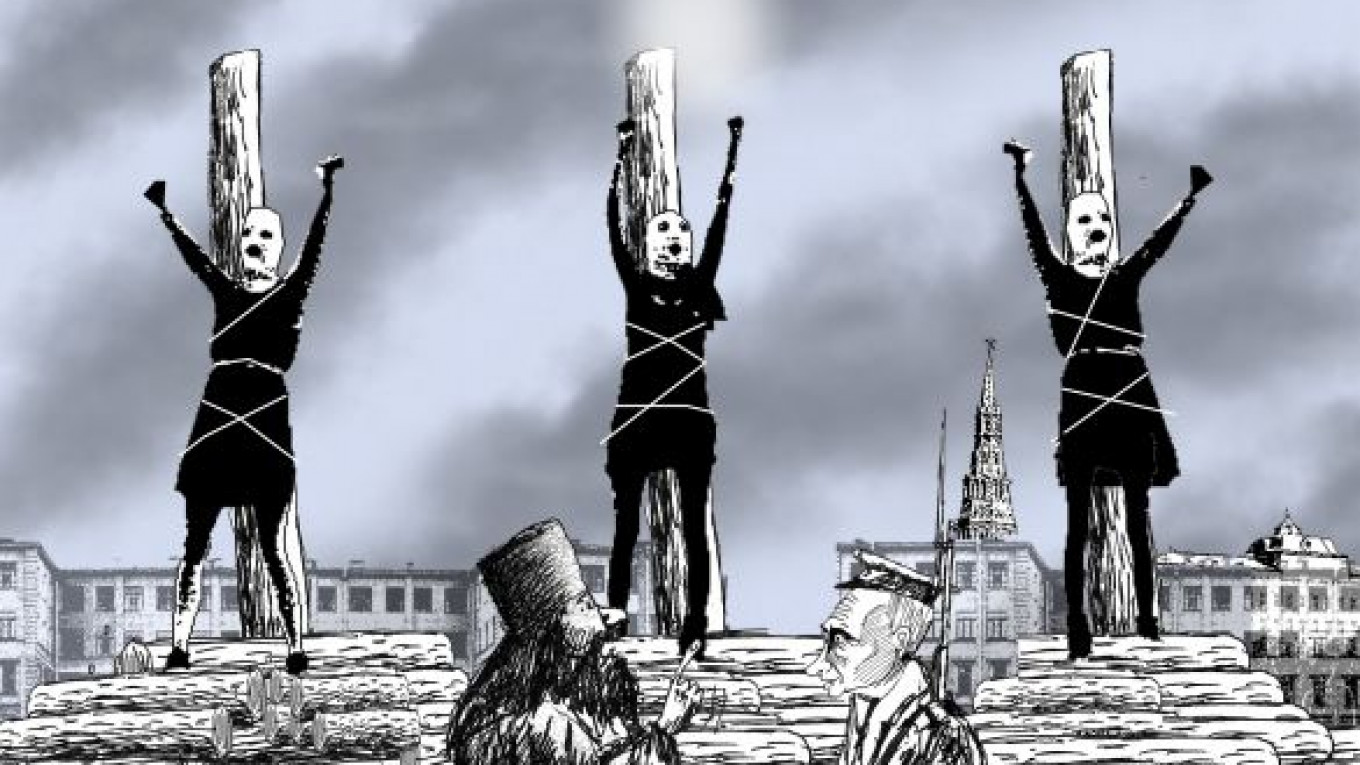Their music is primitive, their lyrics are vulgar and their stage costumes, brightly colored masks with eye slits, are ugly. But they are the most famous punk rock band in Russia. Their last Russian-language video drew more than 300,000 viewers on YouTube, and their English-language version got several thousand viewers more. Meet Pussy Riot, the all-female punk rock band from Moscow.
If you like punk rock or simply wonder where you can catch a live show by the group, the answer is, unfortunately, nowhere. Since February, three group members have been in the Butyrskaya prison, and the other two are hiding out in Europe. Their legal troubles are the result of an incident on Feb. 21 when Pussy Riot tried to perform one of its songs — what they call a "punk prayer" — titled "Mother of God, Expel Putin" in Moscow's Christ the Savior Cathedral. Now, Nadezhda Tolokonnikova, Maria Alyokhina and Yekaterina Samutsevich are accused of hooliganism and face jail sentences of up to seven years.
The language of the indictment harshly describes the actions of Pussy Riot: "Moving around the solea and ambon, areas that are strictly forbidden to visitors, with cynical disregard, they shouted out tunes of religious hostility and hatred over the course of about one minute, chanting obscene phrases and words that insult believers, as well as jumping around and raising their legs."
In its summary, the indictment states that Pussy Riot members "put themselves in opposition to the Christian world … [and] tried to discredit church traditions and dogmas that have been protected and cherished for centuries. … In a clear and unambiguous way, they expressed their religious hatred and hostility to Christianity."
This indictment wouldn't have raised eyebrows if it had been written by a 16th-century court during the Inquisition. But in the 21st century, it is shocking. It reads as if Pussy Riot were being charged with blasphemy somewhere in Sudan, Somalia or Afghanistan, not in a constitutionally declared secular state.
Vladimir Pastukhov, a former visiting fellow at St. Antony's College in Oxford, wrote on his blog at Polit.ru: "Up to now, Russia had kept some mental distance from the Middle Ages. Today that's gone. The authorities have returned to the time of witch hunts, and they are even proud of it. If you think about it, there now is essentially no difference between us and Iran."
But there is also, of course, a political aspect to the Pussy Riot case. As columnist Semyon Novoprudsky wrote on Gazeta.ru, "I wonder what the reaction would have been if they had sung a song in the same Moscow cathedral with the lyrics 'Mother of God, expel Obama.' For some reason, I suspect they wouldn't have been charged with anything."
The three detained Pussy Riot band members are certainly being treated as if they were dangerous political prisoners. Prosecutors spent three months investigating the videotaped incident that lasted no longer than a minute. The rockers have been in detention since their arrest in February. The court has regularly turned down their lawyers' requests to release them on bail, despite the fact that two of them have young children. The court insists that they are being detained for their own good, asserting that if released "they might be the object of criminal infringement" — that is, revenge by religious fanatics. This feigned concern for their well-being rings hollow considering that one of the detained women has gone on a hunger strike to protest beatings by her cellmates.
The varying views on Pussy Riot show how much society is split into two opposing groups. According to a poll by the Levada Center, about half of Russians agree with the criminal charges against the punk rockers, and the other half believe that they either shouldn't be charged at all for their art or that the charges are too strong.
"All the problems are from impunity. There should be either internal censorship or external punishment. They should be whipped so hard that next time they won't have even the slightest intention to behave like swine," wrote blogger N_efremova.
"They are heroines and were put in jail for no crime," countered blogger Хo4y_vkosmos.
These polar opinions reflect in a nutshell Russian society today, which is divided into two nations. One nation has already accepted the Western values of human rights and freedoms, while the other values the country's great power status above all and is happy to endure authoritarian measures and limitations on individual freedoms to maintain it.
The outcome of the Pussy Riot court case is hard to predict, but it will be a good indicator of which time period Russia will live in — the age of Internet or the age of witch hunts.
Victor Davidoff is a Moscow-based writer and journalist whose blog is .
A Message from The Moscow Times:
Dear readers,
We are facing unprecedented challenges. Russia's Prosecutor General's Office has designated The Moscow Times as an "undesirable" organization, criminalizing our work and putting our staff at risk of prosecution. This follows our earlier unjust labeling as a "foreign agent."
These actions are direct attempts to silence independent journalism in Russia. The authorities claim our work "discredits the decisions of the Russian leadership." We see things differently: we strive to provide accurate, unbiased reporting on Russia.
We, the journalists of The Moscow Times, refuse to be silenced. But to continue our work, we need your help.
Your support, no matter how small, makes a world of difference. If you can, please support us monthly starting from just $2. It's quick to set up, and every contribution makes a significant impact.
By supporting The Moscow Times, you're defending open, independent journalism in the face of repression. Thank you for standing with us.
Remind me later.








